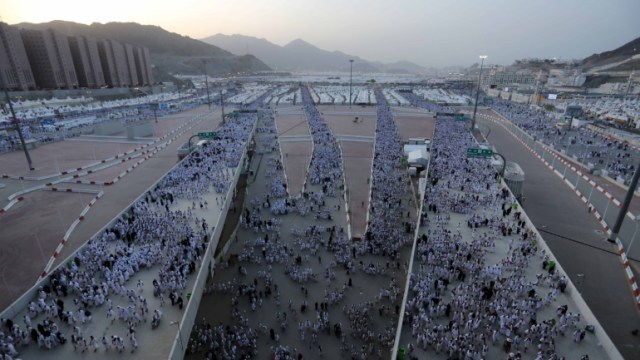The Kingdom of Saudi Arabia announced that it will only receive a few pilgrims this year and will be staying there, in light of the growing concerns about the spread of the new Corona virus.
In a report published by the American Wall Street Journal, the writer Jared Malcin stated that the pilgrimage season, which takes place every year and lasts for five days, and whose start this year coincides with the end of next July, is a source of Saudi prestige on the political and religious levels, in addition to helping it reap Annual revenue of about 8 billion dollars.
Saudi Arabia has recorded more than 161,000 confirmed infections with Covid-19 and more than 1,300 deaths, and until recently, Mecca recorded the highest infection and death rates due to the virus in the Kingdom, with more than 22 thousand infections and 381 deaths.
Saudi Arabia imposed closures last March to stop the spread of the virus, and this included the suspension of various forms of religious gatherings that contributed to the growing spread of the virus in other countries such as Iran, South Korea and India.
Despite the increase in the number of new injuries and deaths, on Sunday, Saudi Arabia lifted most restrictions imposed on economic activities and movement, including night curfews.
Hajj under Corona
The influx of millions of pilgrims from all over the world to perform the pilgrimage carries many risks. According to the Ministry of Hajj and Umrah, "This decision stems from the highest priority of preserving the safety of pilgrims on its lands until they leave for their countries."
The writer explained that reducing the number of pilgrims, who numbered about 2.5 million last year, was a shock to those who were hoping to obtain a Hajj visa this year, but the Saudi statement did not mention the number of people allowed to perform the Hajj pilgrimage or how it will be chosen.
Also, reducing the number of pilgrims and canceling Umrah would deprive the kingdom of billions of dollars in revenues, especially after the collapse in oil prices caused a gap in its budget, which forced it to resort to debt.
Saudi Arabia is home to two of the holiest sites in the Islamic world, Mecca and Medina, which annually host more than 8 million visitors.
Yasmine Farouk, a Saudi researcher at the Carnegie Endowment for International Peace in Washington, believes that the pilgrimage is an annual reminder of the special place that the Kingdom of Saudi Arabia enjoys, and "it is unfortunate that this is not shown to the world" this year.
The decision to reduce the number of pilgrims comes after years of questioning the religious influence of Saudi Arabia around the world in the aftermath of the attacks of September 11, 2001 in the United States, where 11 of the 19 hijackers in the plane were Saudis, which drew attention to local extremism in the country.
It is noteworthy that the Kingdom denied involvement in these attacks, and participated in a massive crackdown on religious extremism in Saudi Arabia, including arresting thousands of people and attaching them to counter-extremism programs.
The stampede that occurred during the performance of the Hajj rituals in 2015 and killed at least two thousand people, also criticized how the kingdom managed the Hajj season.
Hajj is a huge economic resource
In light of the outbreak of the new Corona virus around the world, canceling the Hajj season this year seemed inevitable despite the religious sensitivities involved in this decision. In this regard, Christine Smith Diwan, a resident researcher at the Institute of Arab Gulf States in Washington, said, "The pledge By sponsoring pilgrims on a journey of profound meaning, both personally and jointly, with great responsibility, and it seems that the Saudis are carefully assessing this trust and we must all be grateful for that. "
But the loss of tourism revenue was a major blow to the Saudi economy. Last March, the Saudi government announced its intention to reduce spending to more than $ 13 billion in sectors such as tourism and entertainment, which represents the core of Crown Prince Mohammed bin Salman’s plan to diversify the Saudi economy and reduce His dependence on oil.
Last May, the kingdom doubled its value-added tax three times to 15%, while cutting the cost of living for government employees.
According to government data, religious tourism contributes about 20% of the kingdom's non-oil GDP, and the reduction in the number of pilgrims is expected to destroy the economy of Mecca and Medina, which usually double in size with the flow of pilgrims during the Hajj season, and according to the local Chamber of Commerce, what is concentrated Between 25% and 30% of the private sector economy in Mecca around Hajj.
The writer quoted Professor of Economics at the University of Business and Technology in Jeddah, Ali Touati as saying that "most pilgrims come from abroad, which means the flow of financial returns to the Kingdom, and for this reason, Hajj is considered a huge economic resource."
It is reported that the pilgrimage season has been canceled about 40 times in the past due to diseases and unrest, but it has not been canceled since the establishment of modern Saudi Arabia in 1932.

